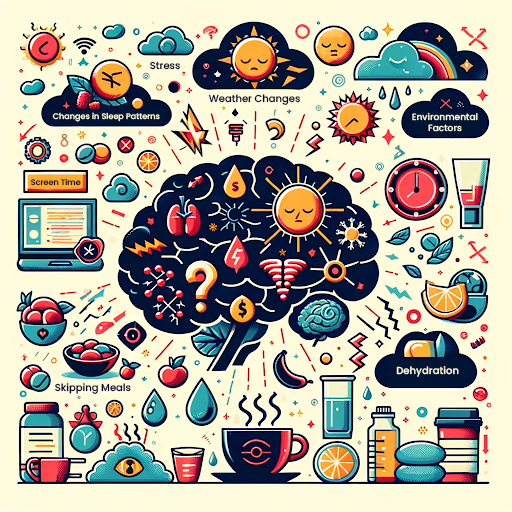Migraines are more than just headaches; they are complex neurological or vascular events that can be debilitating for those who experience them. Understanding what triggers your migraines is a crucial step in managing and potentially reducing their frequency. This blog post delves into the most common migraine triggers and offers practical advice on how to avoid them.
- Food and Drinks
Certain foods and beverages are notorious for triggering migraines in some individuals. Common culprits include aged cheeses, processed foods, red wine, and foods containing MSG or artificial sweeteners and sulphite, tannis and histamines.
How to Avoid: Keeping a food diary can help you identify specific triggers. Once you know what they are, you can avoid them or find suitable alternatives that don’t provoke your migraines.
- Stress
Stress is one of the most common triggers of migraines. The body’s response to stress can prompt changes that lead to a migraine.
How to Avoid: Incorporate stress-reducing activities into your routine, such as yoga, meditation, or deep-breathing exercises. Also, consider talking to a therapist or counsellor who can help you develop effective stress management techniques.
- Changes in Sleep Patterns
Both too little and too much sleep can trigger migraines. Irregular sleep patterns and poor sleep quality can also be problematic.
How to Avoid: Try to maintain a consistent sleep schedule, even on weekends. Create a relaxing bedtime routine to improve your sleep quality, and make your sleeping environment as comfortable as possible.
- Hormonal Changes
For many women, hormonal fluctuations related to menstruation, pregnancy, or menopause can trigger migraines.
How to Avoid: If you suspect hormones are a trigger, speak with your healthcare provider. They may recommend pharmaceuticals to stabilize hormonal levels.
- Environmental Factors
Bright lights, loud noises, strong smells, and changes in weather or barometric pressure can all trigger migraines.
How to Avoid: Limit exposure to known environmental triggers when possible. For example, wear sunglasses in bright light, avoid strong odours, use earplugs in noisy environments, and be aware of changing weather patterns
- Dehydration and Skipping Meals
Dehydration and not eating regular meals can both lead to migraines.
How to Avoid: Drink plenty of water throughout the day and try to eat balanced meals at regular intervals. Carrying a water bottle and healthy snacks can help you stay on track, even on busy days.
Managing Migraine Triggers
While avoiding triggers can help reduce the frequency of migraines, it’s not always possible to avoid them entirely. Identifying your triggers through a process of elimination can be helpful. A headache diary where you note down when migraines occur, what you ate, how you felt, and other environmental factors can be instrumental in identifying patterns.
For those struggling with frequent migraines, seeking professional help is essential. At The Health League, our practitioners are dedicated to helping you manage your migraines effectively. We offer personalized treatment plans that address your specific triggers and symptoms, providing support and guidance to help you lead a more comfortable life.
Remember, each person’s migraine triggers are unique. What triggers a migraine in one person might not affect another. Through careful observation and some lifestyle adjustments, it’s possible to identify and avoid your migraine triggers, reducing the impact of this condition on your life.
